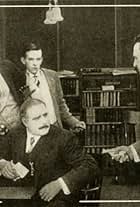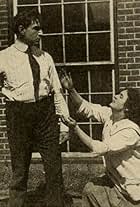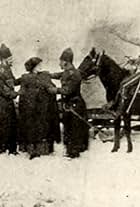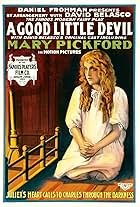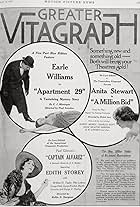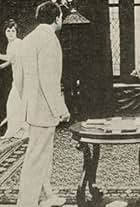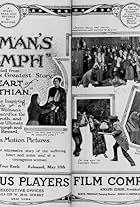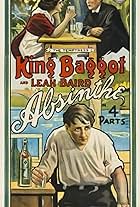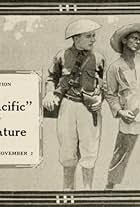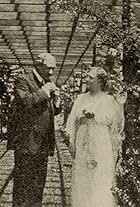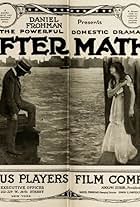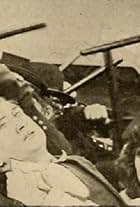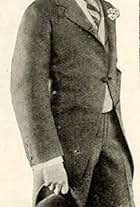List activity
815 views
• 4 this weekCreate a new list
List your movie, TV & celebrity picks.
5437 titles
- DirectorGeorge MelfordStarsAlice JoyceGuy CoombsMarguerite CourtotFoster sister of the Duchess d'Aubeterre, Madeline, marries Jean Renaud, a French soldier, and has a daughter named Adrienne. Five years later, on a battlefield, Renaud is entrusted by the Count de Moray with jewels and papers proving that Adrienne is his heir. After Moray's death, Renaud gives everything to Madeline and then returns to the battle. Lazarre, who had followed Renaud, then goes to Madeline and demands the jewels. Madeline's refusal awakens Adrienne, but Madeline quiets her by saying that her father is home. When Madeline still refuses Lazarre's request, he stabs her. Later, Adrienne tells the neighbors that her father had just been with her mother. Renaud is sentenced to prison for life, after which the Duchess adopts Adrienne. Many years later, Adrienne re-encounters her father and eventually the true murderer is revealed and Renaud is pardoned.
- DirectorTheodore WhartonStarsThurlow BergenElsie EsmondM.O. PennJames Mason has fallen in with bad companions and becomes known to the police as "Handsome Harry." He has just finished a five-year term in prison. Though inclined to reform, he listens to the plea of his pals and consents to renew operations. Under the name of the Morgan Syndicate they carry on their "get-rich-quick" business. The police receive complaints concerning the syndicate. They decide to change the name to the National Investment Company, and offer new inducements. Thus they send out accounts of their oil properties and the large profits which may be expected. Helen Lewis, an elderly widow in the country, who has five thousand dollars, receives one. She writes the confidence men that she is interested and is coming to the city. She requests one of them to meet her at the station. Mason is delegated by his pals to meet her. The unsophisticated woman falls an easy prey to the bunco men and gives them her five thousand dollars and receives certificates of stock. She sees in Mason's watch a photograph of an elderly woman. He tells her it is a picture of his mother who died ten years before. The old lady tells Mason it is too bad that his mother is dead since she would have been proud of her boy. This penetrates the bunco man's conscience and in a flash he sees himself as he is. Going into his partners' office he begs them to give him back the money they have taken. They laugh him to scorn. He escorts Mrs. Lewis back to the station and sees her off. On the way back to his office he determines to be through with the shady business. He again demands the money and when they refuse, he takes it by force. A fight follows, in which he is the victor. He takes the next train for Mrs. Lewis' home that night. She is surprised to see him. Determined to make a clean breast of it, he asks for her stock which he tears up. He tells her the stock is worthless and that the National Investment Company is made up of a gang of crooks, of whom he is one. He goes back to the railroad station but discovers his capital is represented by a few pennies. Further search discloses the fact that Mrs. Lewis has slipped a bill of large denomination in bis vest pocket. He puts the money in an envelope, and mails it to her. Empty of pocket, but high of purpose, he sets off for the city on foot.
- StarsHalfang NeffViola WhittenEdwin NewmanHenry and Alfred Dumaine are brothers of entirely different habits. Henry, cashier of the National Bank, is highly respected, while Alfred is a gambler. Henry, working late in his office, is visited by his brother, who shows him a check for money which he cannot pay. The safe door, being open, is Alfred's opportunity for stealing money while Henry is looking over the check. Alfred is refused and leaves, without Henry discovering the loss. The bank president observes a shortage and asks about it. Henry, to shield his brother, is silent, and the president, believing him guilty, has him arrested. He is sentenced to prison for fifteen years. Ten years later Henry sees an opportunity to escape from the fort. In making his dash for liberty he is seen by the guards, who open fire on him. Diving into the river, he makes good his escape by swimming under the water. During his imprisonment his wife dies and Alfred takes charge of his daughter, Jennie, now a young lady. Going from bad to worse. Alfred and Jennie drift into the camp of roving gypsies. Jennie is forced to go from door to door selling the baskets made by the gypsies, while Alfred drinks all the money and makes her life miserable with his brutality. One day, while pulling a child from beneath the wheels of a speeding automobile, Jennie is injured and taken in the car to the camp. The young journalist who accompanies her, seeing her surroundings, forces her to tell her story. His interest turns to love, and she runs away to become his wife. Henry, beginning life anew, becomes prosperous and is anxious to find his daughter. His advertisement in the papers is seen by Jennie and Alfred. The journalist, thinking it is a scheme to locate and kidnap his wife, advises her to take no notice of it. Alfred, not knowing the whereabouts of Jennie, schemes with one of the gypsies to substitute his daughter for Jennie. Alfred then calls at the hotel, but when he sees his brother he fears for his own safety and sneaks away. He writes a letter to Henry, asking him to call at the camp. Henry arrives and Alfred falls on his knees and begs for mercy, producing the girl who substitutes for Jennie, making him believe it is his own flesh and blood. The journalist, to satisfy his own curiosity, decides to answer the advertisement and sends Jennie to see banker Parker, Henry's assumed name, but finds he has left to sail for America. Jennie's husband visits the gypsy camp and is seen approaching by Alfred. Walking to the wagon, he knocks at the door, and receiving no answer, he enters. Alfred locks him in and pushes the wagon over the steep cliff. Jennie's husband is horribly mangled in the smash and being in such a precarious condition after his arrival at the hospital, Jennie is not allowed to speak to him. Banker Parker, believing he has found his daughter, takes passage for New York, taking along Alfred. After making inquiries, Jennie finds when they are to sail and decides to follow them on the Imperator, disguised as a man. Finding out a scheme, she later obtains an invitation to a masked ball at Parker's home. She makes an exact duplicate of the costume she wore at the gypsy camp and attends the ball. Alfred is dumbfounded when he recognizes Jennie and she adds to his discomfort at every opportunity. Jennie, entering Parker's private office, is followed by Alfred. Opening a drawer she discovers proof. When Alfred enters the room, Jennie, to escape, turns off the light. The false Jennie, thinking something is wrong, follows, and coming into the room just as the lights are turned off, is seized by Alfred. Thinking it is Jennie, he chokes her to death. The guests rush in and Jennie explains all to her father, and Alfred is taken away to his just punishment.
- DirectorElwood Fleet BostwickStarsEdyth TottenThe story tells of the sorrows of Angie Smith the "Magdalen," caused through her betrayal by Walter Williams, the manager of the mill in which Angie is employed. In the beginning of his acquaintance with Angie, Williams proposes marriage to her, but later decides that it would be more to his temporal advantage to marry Mercy Mackey, the daughter of the owner of the mill. As the time approaches when Angie is to become a mother, Williams is accused of his perfidy by Mr. Mackey. The result is a violent, altercation during which Williams strikes Mr. Mackey and kills him, Angie being the only witness. The murder takes place in the mill yard, and as Mackey falls prostrate at the feet of Williams, Angie looks through the window of the mill and sees the crime. Due to her love for Williams she keeps the knowledge to herself. After the murder Williams forges Mr. Mackey's name to a paper, the purport of which is that it is Mr. Mackey's wish that Williams remain at the mill as the permanent manager. The forged testament also contains the wish that Mercy Mackey and Williams marry. Mercy has been secretly admired and loved by one of the mill foremen, Rufus Sweet, who, on account of the disparity in their stations in life, has not declared nor shown his love. At the time of the murder Rufus is accused by Williams. He is arrested, but is exonerated, and on his release he disappears. About the same time Angie goes away and leaves no trace. Meanwhile, Williams persuades Mercy to marry him. Rufus, who, in his new environment, has become an inventor of note and has amassed considerable wealth, reads an announcement of the marriage. He finds Angie, and together they return to their native town, arriving on the day that Williams is to marry Mercy. As the ceremony is about to be solemnized Angie interrupts the wedding and declares Williams is the father of her child, and thus makes it impossible for the marriage to take place. Williams then declines rapidly in the moral scale and his next misdemeanor is the robbery of the mill safe. He also decides to be revenged on Angie, and with this end in view he hires a gang of cutthroats to murder Angie and her baby. Angie is thrown into the rushing mill sluice, thereby being apparently doomed to certain and swift death. Rex, a wonderful police dog, belonging to Rufus, rescues Angie. At this part of the story Rex takes a leading role, as he not only is the means of rescuing Angie, but he also recovers the missing mill cash box. He is seen taking this box from under a pile of heavy stones, where it has been hidden by the robber. Rex is then seen as the chief factor in a most exciting cross country chase, in which he finds the gang of thugs in their retreat, which is a hut in the midst of the woods. He holds the men until the posse arrives, when they are arrested under circumstances of the most exciting sort. Williams is finally called to account for his various misdeeds, is arrested and sent to prison to pay the penalty which is exacted for all evil-doing. The story closes with the death of Angie, her last wish being that Rufus and Mercy marry. She clasps their hands together and her brave spirit departs, glad of its release from the pain-rack body.
- DirectorFord SterlingStarsFord SterlingAlice DavenportRube Miller
- StarsFraunie FraunholzClaire WhitneyJames O'NeillSlowly and painfully a long line of suffering political prisoners were being brutally driven through the blinding snow to the barren wastes of Siberia, where they were destined to spend the balance of their lives in toil and sorrow. At the rear of the line patiently trudged a feeble old man, who in spite of his advanced years had brought the cruel vengeance of Russia down upon his head by daring to speak his mind in the interests of freedom. In the distance could be seen a small sleigh driven by an aged woman at whose side sat a strikingly beautiful girl. They were the wife and daughter of the exile, who were sharing his sad lot. In the camp of the prisoners they were allowed to live in a small hut, where they tried in vain to make the father comfortable, and soon realized that unless he could be taken back to civilization he would surely die. They sawed a hole in the floor of their hut and placed a trunk with a movable bottom over it. Then placing the old man beneath the floor they put some of his clothes and a note telling of his suicide on the riverbank and waited. For weeks they fed and cared for him secretly while the officials thought him dead. Finally they were given passports and told to return to Russia. The trunk was searched and found to contain clothes, but it was no sooner locked than the exile dropped the clothes into the cellar, and taking their place, was safely on his way across the border. In Russia, General Romanoff had ordered a massacre and his son had been stripped of his uniform for refusing to carry out the general's orders to slay the innocent. Sadly he left his father's house resolved never to return. On the road he met the exile, whose sleigh had been overturned and while helping him, fell under the spell of the large serious eyes of his beautiful daughter. Together they joined a revolutionary society, and when lots were drawn to destroy General Romanoff, the girl found herself called upon to do the dangerous work. Not knowing that the general was the father of her gallant lover, and embittered by her own father's death she consented. A bronze statue was presented to the general, who received it as a token of appreciation of his work, little dreaming that it contained the girl who was bent upon his destruction. But her lover had decided to save his father and the girl at all costs, and the deed was prevented at the very last moment with the general still innocent of his near approach to death. Mourning his son, the general wrote him a letter of forgiveness, but tore it to bits when he learned of his application to the revolutionists. Likewise the son wrote his father begging forgiveness, but destroyed the letter when the general ordered a new massacre. A terrific battle was fought in the streets, the father leading his troops in person against the forces of his sun. In the thick of the fight the general, seriously wounded, experienced a strange realization of the equality of man as he gave his last drink of water to a common revolutionary soldier and clasped his hand in brotherly love ere his soul had fled. So the general's son and the exile's daughter found the two old soldiers peacefully sleeping in each other's arms and their grief was tempered by the mute evidence of the general's change of heart as they smiled tenderly through their tears.
- DirectorSidney DrewStarsSidney DrewEdith StoreyCharles KentA young woman discovers a seed that can make women act like men and men act like women. She decides to take one, then slips one to her maid and another to her fiancé. The fun begins.
- DirectorGeorge L. SargentStarsThomas A. WiseChester BarnettEvelyn BrentWilliam H. Langdon has been elected senator from Mississippi, and reaches the national capital with the experience in big politics that might be expected of a man who has lived his life on a plantation forty miles from a railroad. With him are his two fair daughters, Carolina and Hope. He has scarcely reached his hotel when he hires "Bud" Haines, a newspaper man, as his secretary. Charles Norton, representative from Mississippi, James Stevens, senior Senator, and Horatio Peabody, senator from Pennsylvania, are interested in a scheme to have a naval station located at Altacola, Miss., and they need the assistance of the new senator. They have purchased all the land in the neighborhood and plan to dispose of it to the government at their own price after the bill is put through. In order to insure his support Norton induces Langdon's son to invest $30,000 in Altacola and also puts in the fortune left the Senator's daughter by her mother. He is the girl's accepted suitor, by the way. Haines, in the meantime, has been a thorn in the side of the crooks, but by reporting to each that the other has played false and invested money in the land project, they bring about an estrangement between him and Langdon, which is set right by Hope Langdon telling Haines, with whom she is in love, of the plot. Langdon and Haines find they have been duped and the man from Mississippi decides to balk the thieves, even if it ruins his family. The story comes to a right ending by Langdon stepping into the Senate to make his maiden speech, denouncing the intended fraud, and declaring that he and the conspirators bought up the land to save the national treasury from being looted after having discovered a conspiracy in another quarter to commit the holdup. Before this important event he has compelled the two rascally senators to come to his way of thinking through fear of exposure. Congressman Norton is sent on his way in disgrace. Haines, again secretary, is engaged to wed Hope.
- DirectorEdwin S. PorterJ. Searle DawleyStarsMary PickfordErnest TruexWilliam NorrisCharles MacLance, a mischievous little boy sent to live with his cruel aunt, Mrs. MacMiche, takes his happiness from the make-believe world of fairies which he has created with Juliet, a little blind girl. When Charles' aristocratic grandfather dies, however, he is sent away to an expensive school, in preparation for his adult life as a lord. As he grows up, he forgets Juliet and his make-believe friends, and becomes engaged to a fashionable society girl, but the soul of his former self leaves him to rejoin the good fairies. Meanwhile, Mrs. MacMiche has come to believe in fairies, and in her new goodness, she asks Charles to come and live with her again. At first reluctant, Charles soon resurrects fond memories of the past. Juliet, whose sight has been restored, helps him to complete his change, and he asks her to marry him. In the end, the couple live happily with Mrs. MacMiche in their fantasy world.
- DirectorRalph InceStarsAnita StewartE.K. LincolnCharles KentThe story concerns a mercenary and managing mother and her daughter, Agnes. The young lady loves a youthful doctor, but a match is frustrated by the mother, who seeks to marry the daughter to the highest bidder. The mother's extravagance ruins the father, who, being in ill health, succumbs to heart failure. With poverty staring them in the face, the mother takes Agnes abroad, finally forcing her into a marriage with an Australian millionaire. To do so, the mother intercepts all letters between Agnes and the young doctor, with the result that each feels that the other has ceased to care. The millionaire and his young wife, while on their honeymoon on his yacht, are shipwrecked. He is dealt a terrible blow on the head, and it completely destroys his memory. The young wife is saved and returns to America, while her husband is picked up by a French fisherman. His memory gone, he does not recall his previous existence in America. Agnes and the doctor renew their love affair and finally marry, excellent proof having been furnished that her former husband had drowned in the shipwreck. There is no opposition to the marriage now, as the mother also had perished in the catastrophe. Five years later, the young doctor has become a famous brain specialist. To him, Agnes' former husband comes for an operation in the hope of restoring his lost memory. The two men, never having met, fail to learn they are both married to the same woman. She discovers it, however, and with her happiness at stake, does not tell her surgeon-husband the truth, but attempts to dissuade him from operating on her first husband, fearful that the operation will prove successful and her first husband regain his lost memory and recognize her as his wife. The humanity in the surgeon surmounts his wife's pleas, but the patient fails to withstand the operation and Agnes' happiness is assured, despite the terrible situations which confronted her.
- StarsMaud Hall MacyRobert VaughnL. Hampton, a young lawyer, being in very poor health, is advised by his physician to go to the Canadian wilds on a hunting trip. In accordance with this advice he makes the trip, and under the assumed name of Iveson, joins a hunter's colony. He is introduced to the hunter's daughter, and in a comparatively short time falls in love with her. With the consent of her father, the two are married. Sometime later Hampton is called back to the city by one of his clients to conduct a very important case. He takes leave of the hunter and his wife, giving as a reason for not taking her with him that her customs and crude speech would act against him in the city. He promises, however, to return for her upon completion of the trial. Upon returning to the city, he is informed by his friends that the trip made a new man of him. He at once takes charge of the case, and in due time, wins it for his client, a beautiful lady, whom he decides to marry, completely forgetting about the wife whom he married under the assumed name of Iveson. Time passes, the unfortunate daughter of the hunter ever thinking of her husband. After a lapse of fifteen years, her son, tired of life in the woods, decides to go to the city and seek employment. On arrival, he makes the acquaintance of the captain of a barge, the two become fast friends, and young Iveson is engaged by his friend to work on the barge. One day, while the two were in a saloon, the captain happens to flash a big roll of bills, which immediately attracts the attention of one of a number of ruffians. The ruffian kills the captain. In the mix-up which ensues, the assailant makes good his escape, while a general tumult follows, after which young Iveson is charged with murder he did not commit. He is held, tried and convicted on so-called "Circumstantial Evidence." Sentence of death is passed by his own father, who had since been elevated to the judiciary. Being quite a popular judge, he is nominated for the office of Governor. In the meantime, Mrs. Iveson, through a newspaper, learns of the predicament her son is in, and resolves to go to the city in an effort to save him from the death chair. In pleading with the judge for leniency she recognizes in him the man who had deserted her. The recognition becomes mutual. Hampton realizes that a word from the woman would ruin his political career, and endeavors to come to terms with her. There is only one condition on which the woman will maintain silence regarding the unlawful second marriage of the judge, and that is that he sets her son at liberty. This the judge has no power to do, but promises, that after his election to the Governorship, he will pardon young Iveson. Hampton is elected Governor, but neglects to fulfill his promise as to the pardon. Iveson's mother, who left for her home, now returns to the city with the intention of exposing the Governor. While on her way to the executive chambers, she meets the second wife of the Governor and their daughter. After a conversation, the unfortunate mother decides not to ruin the lives of Mrs. Hampton and her daughter, but asks them to use their influence in the securing of the pardon. The pardon is eventually granted and young Iveson is restored to his now-happy mother.
- DirectorLeopold WhartonTheodore WhartonStarsM.O. PennThurlow BergenBilly MasonAn Indian rajah determines to give the prince, his son, the advantages of an American university education, and brings him to the United States. Arriving at the university town they stop at the hotel there and are immediately besieged by the reporters who scent a good story, especially as it is reported that the rajah brings with him one of the famous jewels of the world, a magnificent diamond. Among the reporters is a young man on his first assignment who at once makes friends with the prince. In the meantime Nell Reardon, the "badger queen," is approached by Moreland, a "gentleman" crook, and threatened with exposure if she does not aid him to obtain possession of the rajah's jewel. She promises her aid and as a first step registers at the same hotel as the rajah, under the alias of the "Countess Mirska." Billy is assigned to interview her. The prince is struck with the woman's charms and persuades Billy to introduce him. At the instigation of Moreland. the woman persuades the prince to show her the diamond. Fearing his father's displeasure the young man secretly takes the jewel from the strong box. Seeing their opportunity, Moreland and Harley, his "pal," invite the prince to have some refreshments at the hotel café and the prince asks to have Billy included in the party. The jewel is passed around and admired. By accident, and while no one is looking, it falls from the case and lodges in the cuff of the reporter's trousers. Later, while in his own room, he discovers it and immediately runs back to the hotel to return it to the prince. Unable to find him, he decides to stay at the hotel for the night, takes a room and throws himself upon the bed, fully clothed. The anxiety of his responsibility preys upon his mind so that his slumbers are disturbed and his rest is a nightmare. In the meantime the prince discovers the loss, tells the crooks of it and they search the café together. The crooks secretly believe each other guilty, but when they tax one another with the crime they mutually prove their innocence. Without saying anything to each other they visit the reporter's home and search his room. Finding one another in the room their mutual distrust deepens. Billy's distraught mind causes him to talk in his sleep and while doing so he drops the jewel over the hotel balcony. It falls at the feet of the prince, but he does not enjoy its possession long. Harley, who has been spying upon him, knocks him out and escapes with the diamond. The further vicissitudes of the diamond are intensely interesting and lead up to the superb climax where the prince recovers it and sees the baffled crook, Moreland, go over the bridge into the ravine below in the trolley car in which he has tried to escape.
- DirectorAlexander F. FrankStarsK.M. TurnerDorothy GwynneCharles PerleyThe story opens with a full view of the Brooklyn Bridge with a woman in a nervous state stealing along. A policeman, noticing something amiss, approaches her, but too late. The woman jumps to the river below. A sailor on a passing tug dives overboard and rescues her. A harbor police-boats puts out from shore and they are both taken aboard. Dr. Warren, who is among the crowd on the shore, offers his assistance, but ordinary methods of resuscitation fail, and a call is given for a lung motor. This revives the woman and she is taken to a hospital where the doctor and his wife are her only visitors. They take a general interest in her, not realizing she is addicted to drugs. The woman, fully recovered, is brought to court and charged with attempted suicide. She is about to be committed to Blackwell's Island, but on the doctor's and his wife's promise, she is paroled. She is made assistant nurse to the doctor and later becomes infatuated with him. He is not aware of it, but some of his patients notice it and send Mrs. Warren an anonymous letter which she at the time ignores, still believing in her husband. However, on entering her husband's office just as the woman in the throes of an overdose of cocaine and is confessing her love for him, she perceives that something is wrong. Not being satisfied with her husband's explanation, she decides to install a dictograph from his office to her bedroom. Shortly after the dictograph is installed, she hears the woman again avowing her love, also her husband's repulses. Furious she enters the office and orders the woman to leave the house. She leaves vowing vengeance. The wife confesses about installing the dictograph. Forgiveness is granted, and the dictograph is disconnected. Mrs. Warren attends a reception where she meets Mrs. Halley, who has an opera cloak similar to the one worn by her, and upon leaving the maids give them the wrong cloaks. Mrs. Halley decides to return Mrs. Warren's cloak personally and orders her chauffeur to drive her to the Warren home. Arriving there she is ushered into the doctor's office. The woman, in the meantime, is prowling about the grounds, and mistaking Mrs. Halley for Mrs. Warren, shoots her from a window of the office. The police are notified of the murder, and in searching the house find the wires that were attached to the dictograph as well as the anonymous letter. Tracing the wires, they find they lead into Mrs. Warren's bedroom, thereby giving a motive, and Mrs. Warren is placed under arrest. The woman, reading in the paper that she has reaped vengeance on the wrong woman, is terror stricken, but as she reads further that Mrs. Warren has been arrested for the crime, she gloats over it. Being out of funds, the woman in seeking employment, enters the building where the dictograph offices are situated. Being unable to secure employment and in a state of prostration from lack of cocaine, she starts muttering and gloating over Mrs. Warren's predicament. Her voice is heard through the dictograph and an attempt is made to capture the woman, but as the men arrive in the corridor, the woman is seen descending in the elevator. The woman is finally caught by detectives who engage a room in the same house and in her absence a dictograph is installed connecting both rooms over which the detectives and the police hear her re-enact her crime. She is immediately arrested, her reason entirely gone. Mrs. Warren is released and husband and wife are happily reunited.
- A young woman named Katherine works hard in the office of a promising young attorney, Harry Buch, to support herself and to care for her mother. The latter has been ill for some time and is treated regularly by a young doctor. Katherine falls in love with the doctor, and it is on this account that she refuses to marry her employer who had proposed to her. During one of the visits of the doctor, Katherine notices a picture in his possession which he says is that of his sweetheart. The condition of Katherine's mother becomes worse, and the doctor decides that an expensive operation is necessary to save her or prolong her life. The girl learns of this, and decides to marry her wealthy employer in order to raise the necessary money, but she voices her true sentiments to the doctor. She promises however, to try to learn to love her prospective husband. Buch and Katherine are married and it is through the aid of the lawyer that the operation is performed and the life of the girl's mother is saved. The couple live happily until Buch becomes entangled in a financial difficulty and loses money which was entrusted to him and for which he was to give an accounting in three years, when the rightful owner would become of age. Not seeing his way clear to make good the loss, the young attorney decided to commit suicide, but is prevented from doing so by his wife who urges him to go to the mining fields, there try to regain the fortune he lost. Meanwhile the doctor's fiancée, tired of the length of the engagement, breaks it and marries another man. The doctor, grieved at the loss, takes to drink, loses his practice, and after a series of wanderings, lands in the place to which the lawyer had gone. In the meantime the lawyer's wife gives birth to a son, and having lost her mother, decides to go to her husband. On her arrival, the baby takes sick, and the mother applies to the doctor for medical aid, which is refused because of his hatred for women. As a result the baby dies. Harry Buch, now a prospector, informs his wife that he has been fortunate in making a good strike. This is overheard by George Fiske, another prospector, who decided to rob Harry of it. Fiske follows him to the mine and there induces him to accept him as a partner, the two to work the mine together, it being Fiske's intention to explode the mine while working it. Harry, however, catches him in the act. A fight ensues which terminates in the explosion of the mine, the death of Harry, and serious injury to Fiske. Harry's wife, on hearing the explosion, goes out looking for her husband, and finds both him and Fiske in one mess. She has her husband buried, but takes George to the house and nurses him. She leaves the house to get aid, but on returning with Dr. Black finds George dead. Dr. Black persuades her to return to the city and allow him to take care of the mine. Two years elapse. Dr. Black sends Katherine enough money to pay the debts that her husband, the lawyer, had contracted on bonds which were entrusted to him as guardian. Dr. Black, upon receipt of a good offer for the mine, sells it. He writes Katherine, advising her that his profession and heart are calling him to the city. He returns, tells her of his love for her, and they are married.
- DirectorJ. Searle DawleyStarsLaura SawyerBetty HarteGeorge MossBeanie and Effie Deans are the two daughters of old David Deans, a thrifty Scotchman and strict church member, living near Edinburgh. David has reared his daughters in accordance with his rigid and austere ideas of life. The two sisters are as different in appearance and mind as two people could possibly be. Jeanie is steady, calm, noble and unaffected in dress and manner, while little Effie is gay and flighty, fond of finery and flirtations. Arriving at womanhood, Effie falls in love with young Georgie Robertson, the profligate son of a rich minister. Georgie has wandered far from his father's home and fold, and in his love for adventure becomes entangled with a band of smugglers. Under promise of marriage, Georgie often meets Effie secretly and gains her love and trust, but on his way to their prospective marriage is waylaid and arrested, in company with the leader of the smugglers, and thrown into prison. Effie has kept her family in ignorance of her love and betrothal, and has withheld from Jeanie even a greater secret, that she is to become a mother. Crushed by her misfortune, little Effie manages to secure a position in Edinburgh, and there receives word from Georgie, in prison, to go in her hour of trouble to friends of his who will care for her. She goes to these people, Madge Wildfire and her mother, a strange, eccentric pair, the mother a wicked old hag, the daughter demented through grief over her dead babe. They shelter Effie while her own little one is born, but the crazed Madge steals the young infant, leaving it alone by the roadside. The child is rescued by strangers, but is lost to Effie, who finally returns home, still guarding her sad secret. And there, for a time, she finds peace and quiet. But the old hag, fearing lest Effie accuse Madge of stealing the child, determines to accuse Effie of killing her own babe. Effie is torn from her dazed and grief-stricken family and thrust into prison, awaiting trial. During this lapse of time Robertson has escaped from prison, and incited a riot to rescue the smuggler-leader, who is popular among the town folks. Learning that Effie, too, is in the prison, Robertson also strives to effect her release. To his alarm and surprise, Effie refuses to leave the prison until her innocence is proved, and he is forced to leave without her. Desperate, he remembers the old Scotch law to the effect that if the accused has told any of her family that she is to become a mother, the statement is accepted as an evidence that she does not intend the death of her child. Robertson therefore writes Jeanie, begging her to meet him at midnight at an old church, and bidding her tell no one why he wishes to see her. This note he gives to Mr. Butler, a young minister, who loves Jeanie and is loved by her. Butler bears the note to Jeanie, demanding to know the reason for this appointment, but she steadfastly refuses to tell him, causing an estrangement between them. Jeanie meets Robertson, and he pleads with her to lie in court and thus save her sister. Meanwhile, Butler has been questioned by the authorities, on the occasion of a visit to Effie, as to his acquaintance with the escaped prisoner, Robertson, and is forced to reveal the contents of the note he bore to Jeanie. A searching party goes in pursuit of Robertson, led by Madge Wildfire, who knows the district better than the others. Madge divines the men mean danger to Robertson, whom she admires, and warns him with a wild song, so that he escapes in time, but without having secured Jeanie's promise. Jeanie visits Effie in prison, and is again begged to tell one little lie to save her sister's life, but she cannot escape her slavery to truth and honor, and refuses. At the trial Effie is condemned to die. Jeanie then goes barefoot to London and begs the Queen for her sister's life, telling her all. Though they offer the pardon in exchange for Robertson's hiding place, she staunchly refuses to reveal it. Her loyalty and strength appeal to the Queen's sympathies, and she grants the pardon. Stopping for nothing, she hastens back to the prison, and reaches the place of execution just in time. And so Jeanie saves her sister's life without the blight of having told a lie.
- DirectorEdwin CareweStarsDorothy DaltonSamuel E. HinesMillarThe Escott family, on their way to Montana, is attacked by Indians. Army Lt. Joe Lanier afterwards finds little Elsie Escott, the only survivor, and brings her to his mother, who takes in the girl and raises her. Joe later leaves the army and becomes a successful miner, and over the years as he sees Elsie grow into a woman, he falls in love with her. Soon, however, a handsome stranger named Bob Stanton becomes his rival for Elsie's affections, and when Joe becomes jealous Elsie gets angry and makes plans to elope with Stanton. However, a war with Spain complicates everything.
- DirectorPierce KingsleyStarsHerbert KelceyEffie ShannonRobert VaughnA little maiden / Climbed an old man's knee, / Begged for a story. / Oh, Uncle please. / Why are you single? / Why live alone? / Have you no babies? / Have you no home? The story he tells her follows: John Dale is an eminent bachelor lawyer who has never felt the sting of Cupid's dart. A millionaire friend of John's invites him to join a yachting party. The girl that John may have been waiting for appears in the person of Louise Tate, who is accompanied by her father, James Tate; it is love at first sight. John is made a welcome visitor at the Tate home. The family consists of four persons: Mr. and Mrs. Tate, their daughter Louise, and their son Gerald. While at college Gerald played card games with the other students which caused them to be expelled from the institution. Gerald's father, learning of his son's disgrace, is enraged beyond measure and is about to order Gerald from his home when Louise and her mother intercede for him. Gerald finds his mother's necklace upon the library floor where it had fallen in her attempts to shield her son from the father s attack. Gerald takes the necklace to a pawnbroker and pledges it, intending to gamble and try to win enough money to pay his debts and have sufficient left to redeem the necklace. Gerald soon loses the money on the races. After missing her jewels the mother summons detectives, who find the missing jewels in the pawnshop. While the pawnbroker is receiving his check from Mr. Tate, Gerald walks into the room and is recognized as the one who pawned the necklace. He is ordered from his father's house forever. For his reckless dissipation he is sent to prison for four years. After escaping from prison, he returns to the city to obtain honest employment but is found by one of his former pals, who forces him by threats of exposure to join them again. In the meantime John Dale and Louise have become engaged. The annual Charity Ball is announced. This item comes to the attention of Gerald's underworld friends who select him to go to the ball to play his supposed trade of a thief, yet in his heart, he had made up his mind not to do anything dishonest. He goes to the ball where he meets his sister, Louise, who nearly faints when she sees him. As she totters Gerald places his fingers to his lips to indicate silence, and John just turns in time to catch Louise and assist her to an ante-room. While he goes for a glass of water Gerald appears, and while fondly kissing his sister, is discovered by John, who becomes so enraged that the glass falls from his hand and breaks to shards. Having never met her brother, John stands rooted to the ground by his sweetheart's supposed infidelity and demands to know why the strange man was kissing her. John takes Louise home where the quarrel is renewed and the couple, misunderstanding each other, never met again. John turns over his office to a junior partner and sails for a tour of the world. In the meantime Louise has slowly been dying of a broken heart. Gerald again breaks away from the gang, and under an assumed name, obtains employment in a large factory, where he is discovered and brought back to the prison, where he saves the life of a keeper and his term is shortened for the deed. Returning to the city, he learns of his sister's illness and, without being seen by his parents, he gains admission to her room, and soon he learns for the first time that he had been the cause of the lovers' quarrel. Louise, before she dies, exacts a promise from her brother that he will explain the scene at the ball to John. The death of his sister kills all the ambition in Gerald, who drifts again to his underworld friends, one of whom has selected a place for good pickings, as the owner of the house is away. It happens to be the home of John Dale, who has unexpectedly returned to his native country. John dispatches Briggs, his valet, with a note to Louise, asking if he may call, but is met by an old servant who tells him that Louise is dead. John is stunned by the news. The night of the robbery, Gerald is forced to climb into the window first where he discovers the photograph of Louise and, picking it up exclaims, "My sister," which is heard by John Dale, who draws his revolver and compels Gerald to hold up his hands. In that position he is found by the next member of the gang. He cries to his chum to stand aside as he levels his gun at John, but Gerald sacrifices his own life by jumping in front of John, who, tearing the mask from his visitor's face, discovers it is the man whom he saw kissing his sweetheart that night at the ball. With his last dying breath Gerald says to John "My sister shielded me that night at the ball, because I was an escaped convict." John is thunderstruck, "My God, her brother. What a fool I was not to have listened to her explanation." The scene dissolves back to the little child with her arms around her Uncle John, who murmured, "That's why I'm lonely, / No home at all. / I broke her heart, pet. / After the ball."
- StarsOwen MooreVirginia PearsonYoung Ruth Morgan, an orphan, decides to leave her small town to make her fortune in the big city. Meanwhile, in another small down, young doctor Allan Buchannan also decides to strike out for the big city. Unfortunately, Ruth falls in love with a rich playboy who soon betrays her, and Allan makes a tragic mistake by accidentally prescribing a drug that results in a child's death. Soon afterwards he learns that his sister has died in a train accident. Despondent and grief-stricken, he walks to a nearby river, intending to end it all by jumping in. There he meets Ruth, who is there for the same purpose.
- DirectorJ. Searle DawleyStarsJohn BarrymoreEvelyn MoorePeter LangBerresford Cruger, junior partner of the New York brokerage firm of Barbury, Brown and Cruger, is left a fortune of 60,000 pounds, by an English uncle, Carew, on the condition that he renounce his American citizenship, become a British subject, and marry an Englishwoman, the money otherwise being assigned to the Archaeological Society of England. Cruger patriotically refuses the fortune on these conditions, when his pretty English cousin, Beatrice Carew, who has been disinherited in favor of Cruger, because of a past romance with an American, suggests to him that they marry, and so keep the money in the family. Cruger's American chivalry, and a strong interest in his attractive cousin are aroused. At this critical moment the disappearance of Brown, with $80,000 which he had had in trust for a Miss Georgia Chapin, is discovered. Cruger and Barbury feel responsible for their partner's defalcation, which adds another incentive to Cruger's consent to a hasty marriage with Beatrice, who immediately returns to England, after both have agreed to leave each other absolutely free. With his newly acquired money Cruger secretly replaces the missing funds, and invests in the Opera House block of a Wyoming "boom" town, proceeding to forget all about it. Later, he and Barbury go to Nice, where Cruger again meets his cousin-wife. Here they fall seriously in love with each other, and many complications, pathetic and comic, ensue. The situation is further confused by the sudden reappearance of Brown, who, it transpires, is the missing ex-fiancé of Beatrice, believed by her to have been accidentally killed. Beatrice is now fully recovered from her love affair with Brown, but his former affection for her is revived when he learns that her fortune, after all, has not been lost. Brown's utter lack of character and manliness is evidenced by his efforts to part Cruger and Beatrice. Cruger realizes that Brown's design is to secure Beatrice's fortune by marrying her himself, and, in a dramatic scene, tells Brown that he had induced himself to marry Beatrice in order to restore Miss Chapin's stolen funds, and that he would consent to a divorce from Beatrice, if Brown would agree to return her portion of the estate in the event that be married her. Brown's ardor cools at this proposal, and he verifies Cruger's scant opinion of him by again disappearing. Beatrice misunderstands Cruger's motive, and condemns him as mercenary. Cruger can offer no defense and secretly bears the pang of Beatrice's innocent misjudgment. Beatrice leaves Cruger in anger and resentment. With a comic irony, the Archaeological Society at this juncture, which has sued to recover the money on the grounds that Cruger was not to share the behest with Beatrice, Carew's disinherited daughter, wins the action, and Cruger and Beatrice are forced to surrender their fortune and are left without funds or resources. With noble devotion, Cruger stints himself to send Beatrice money without her knowledge of the sacrifice, and is himself on the verge of starvation, when joyful word arrives that his Wyoming Opera House lot has really "boomed," and made him $50,000. Meanwhile, Georgia Chapin has learned of his unselfish replacement of her stolen funds, and his sacrifices for Beatrice, with which she loses no time in acquainting her. Awakened to a new realization of Cruger's real worth. Beatrice hastens to him to ask forgiveness, and is received with open arms by her hero, who has managed, through all his difficulties, to regain his American citizenship without losing wife or fortune.

